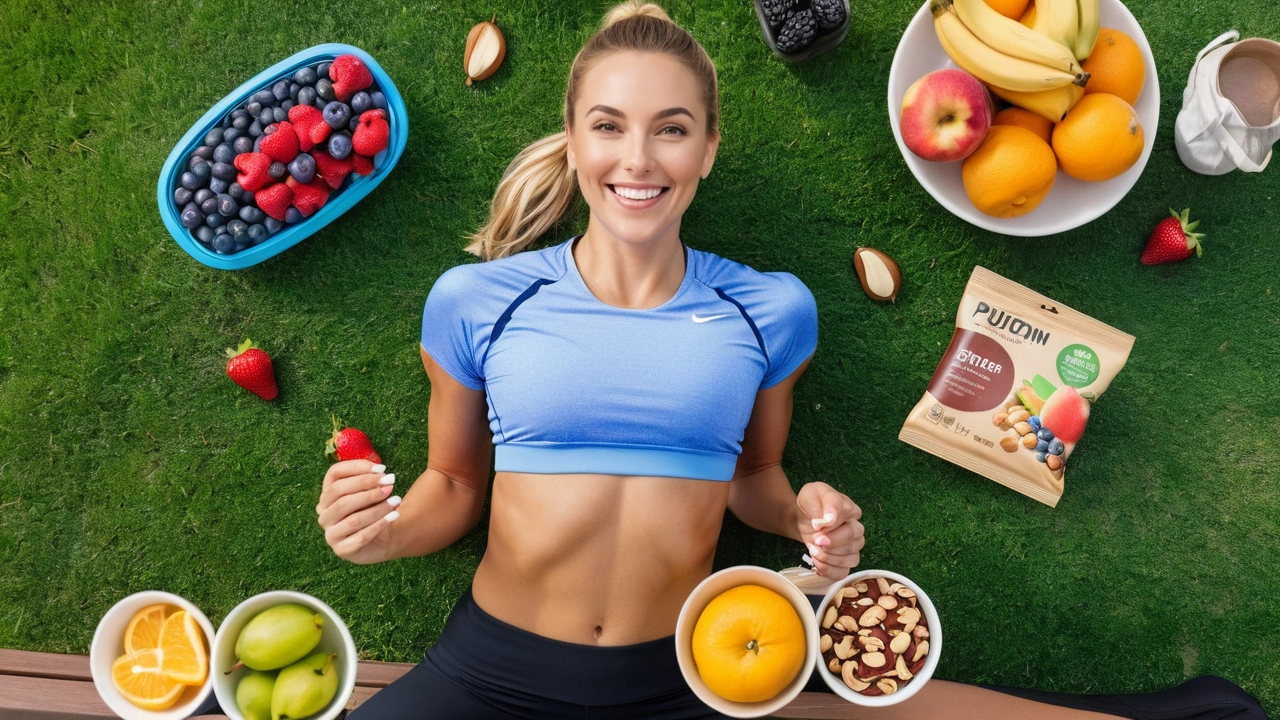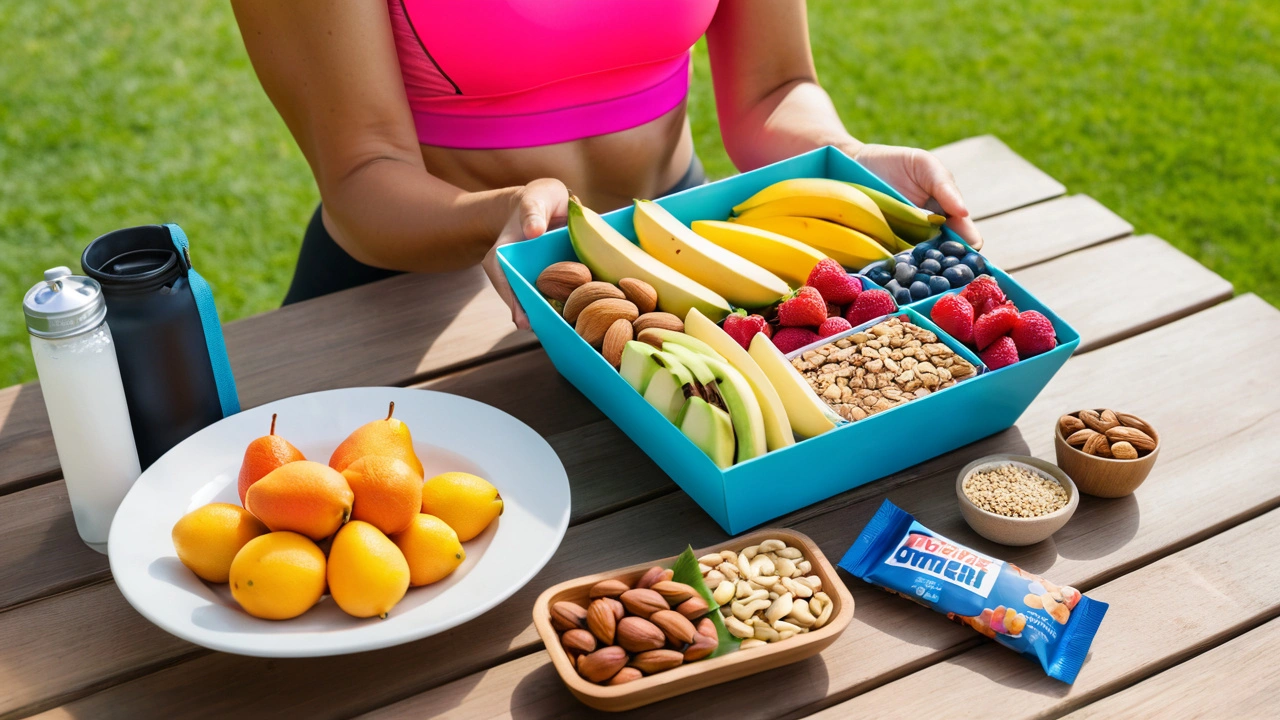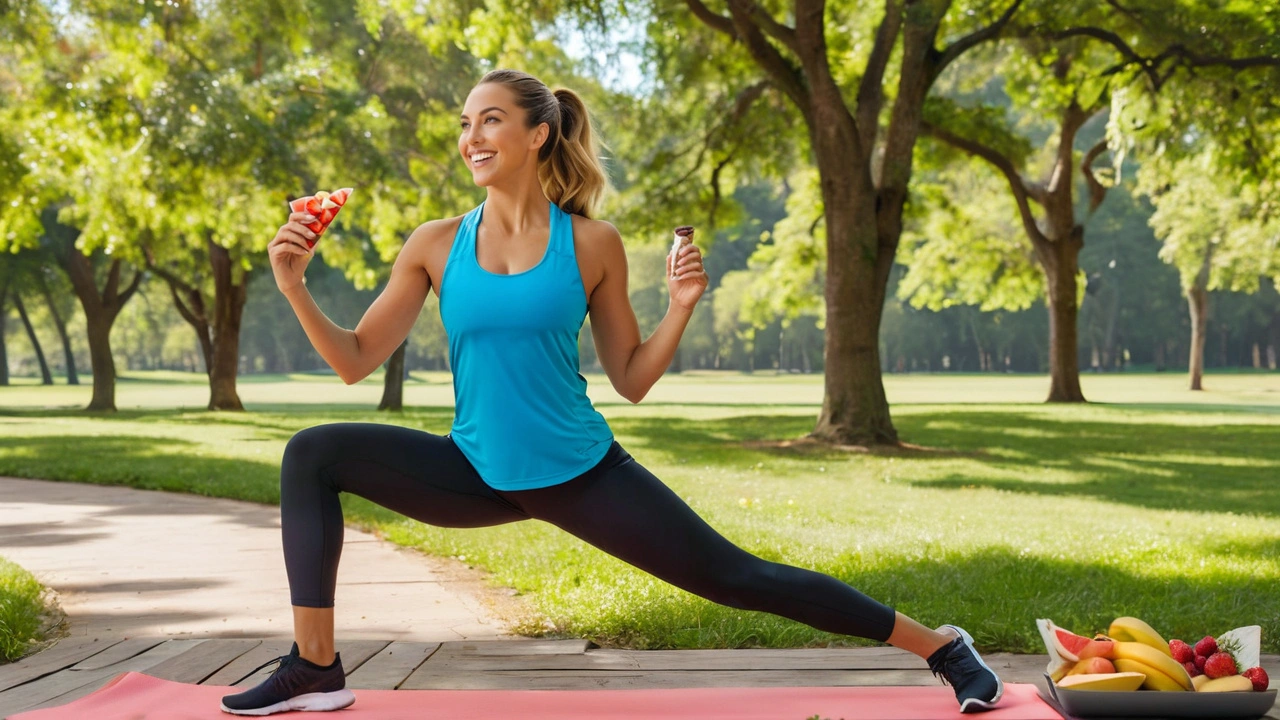Healthy snacks can be the secret weapon for athletes aiming to push their limits and achieve their best results. Far from just silencing a rumbling stomach, these snacks deliver essential nutrients that power workouts, aid recovery, and sustain long-term health.
Considering the physical demands placed upon athletes, the right snacking routine can make a remarkable difference. This article dives into why these bite-sized nutritional powerhouses are so pivotal for anyone involved in sports or physical training. From understanding which nutrients to prioritize to discovering easy, delicious snack ideas, you'll find everything you need to enhance your athletic performance.
- The Importance of Healthy Snacks
- Top Nutrients Athletes Need
- Best Snack Choices for Energy
- Quick and Easy Snack Ideas
- Snacking for Recovery and Performance
- Making Healthy Snacks a Habit
The Importance of Healthy Snacks
For athletes, the importance of healthy snacks cannot be overstated. Unlike regular individuals, athletes undergo intense physical activity that demands higher energy levels and better nutritional support. Consuming healthy snacks ensures that the body's energy reserves are continuously topped up, keeping performance consistent and reliable during both practices and actual competitions.
Healthy snacks are rich in essential nutrients like vitamins, minerals, antioxidants, and fiber. These elements help to strengthen the immune system, reduce inflammation, and promote faster recovery times. According to a study published in the Journal of the International Society of Sports Nutrition, incorporating nutrient-dense snacks can significantly boost an athlete's endurance and performance levels. As Dr. John Ivy mentions, "Timing is more critical than any specific nutrient. Consuming the right nutrients at the right times can enhance performance and recovery more than anything else."
In addition to energy and recovery, healthy snacks also help athletes maintain muscle mass and reduce the risk of injuries. Snacks that are high in protein, for example, aid muscle repair and growth. A popular choice is Greek yogurt mixed with nuts, which provides both protein and healthy fats essential for muscle health. For those who prefer plant-based options, snacks like hummus with carrot sticks can be equally beneficial.
Athletes who incorporate healthy snacking into their routines often notice better focus and mental sharpness during both training and competitions. This mental edge is crucial, as even minor distractions or lapses in concentration can affect performance outcomes significantly. Eating almonds or a banana an hour before a workout can provide the glucose needed for optimal brain function, ensuring athletes are mentally and physically prepared for the challenges they face.
Hydration is another factor closely tied to snacking. Many healthy snacks, such as fruits and vegetables, have high water content, helping to keep athletes hydrated. Dehydration can compromise performance, slow down reaction times, and result in cramps or other muscle issues. Snacking on water-rich foods like watermelon or cucumber slices not only satisfies hunger but also keeps the body hydrated.
The social and emotional aspects of snacking shouldn't be overlooked either. Sharing healthy snacks with teammates can foster a sense of camaraderie and mutual support. This shared ritual can strengthen team bonds and improve overall morale, which plays a crucial role in team sports. Nutritional habits often start young, and seeing peers make healthy choices can influence others to do the same.
Overall, do not ignore the fact that smart snacking involves planning and consistency. Athletes should include a variety of snacks in their diet to ensure they get a wide range of nutrients. The aim is to balance macros—carbohydrates, proteins, and fats—and to seek out nutrient-dense foods that fit easily into a busy schedule. Simple prepped snacks like apple slices with peanut butter or whole-grain crackers with cheese can be grabbed on the go.
Top Nutrients Athletes Need
Athletes have unique dietary needs that can significantly impact their performance, recovery, and overall health. Understanding the key nutrients that are essential for athletes is crucial. It starts with macronutrients like carbohydrates, proteins, and fats, which are the primary sources of energy. Carbohydrates are especially vital as they fuel muscles during high-intensity activities. Whole grains, fruits, and vegetables are excellent sources of good carbs.
Proteins play a significant role in repairing and building muscle tissues. After a strenuous workout, muscle fibers can get damaged, and consuming protein helps in their repair and growth. Lean meats, dairy products, soy, and legumes are great choices for high-quality protein. Fats, though often misunderstood, are also crucial. Healthy fats from sources like avocados, nuts, seeds, and fish provide long-lasting energy, particularly during long endurance events.
Vitamins and minerals are equally important for athletes. For instance, iron is vital for transporting oxygen in the blood, preventing fatigue and improving endurance. Leafy greens, beans, and red meat are excellent sources of iron. Calcium and Vitamin D are crucial for bone health, which is necessary given the physical stress athletics can put on the skeletal system. Dairy products, fortified plant-based milks, and leafy greens offer these nutrients abundantly.
"Athletes' bodies undergo significant wear and tear, and without proper nutrition, their performance and recovery can suffer," says Dr. Jane Smith, a renowned sports nutritionist.
Then there's the importance of electrolytes, particularly sodium and potassium, which are lost through sweat. These are critical for preventing cramps, maintaining hydration, and ensuring proper muscle function. Bananas, oranges, and sports drinks often provide these essential electrolytes. Omega-3 fatty acids, found in fish and flaxseeds, help reduce inflammation, enhancing recovery and reducing the risk of injury.
A well-rounded snacking strategy that includes these nutrients can make a big difference. It ensures that athletes perform at their peak while maintaining overall health. Integrating a variety of these nutrient sources into snacks throughout the day helps in maintaining the energy levels needed for optimal athletic performance and recovery. Tailoring the nutrient intake based on individual needs and the type of sport is also vital for maximum benefits.

Best Snack Choices for Energy
Athletes are always on the lookout for ways to keep their energy levels high, especially during rigorous training sessions or competitions. What you choose to snack on can have a significant impact on your stamina and overall performance. Let's dive into some of the best snack options that can provide an energy boost when you need it most.
First on the list are bananas. These yellow fruits are often referred to as nature's energy bar. They are packed with carbohydrates, potassium, and vitamin B6, all of which help maintain energy levels. The natural sugars in bananas, along with their fiber content, provide a quick energy boost while also keeping you satisfied for longer. A study from Appalachian State University found that eating a banana before intense cycling was just as effective as consuming a carbohydrate drink.
Next up, we have oatmeal. This whole grain is renowned for its slow-digesting properties, making it an excellent choice for sustained energy release. Oatmeal is rich in complex carbohydrates and fiber, which means it provides a steady stream of energy without the spikes and crashes associated with simple sugars. Many professional athletes include oatmeal in their pre-game meals to ensure they have enough fuel to last through their performance.
Nuts and seeds are another fantastic option. Almonds, walnuts, chia seeds, and flaxseeds are all loaded with healthy fats, protein, and fiber. These nutrients contribute to slower digestion and a more stable blood sugar level. Plus, nuts and seeds are incredibly portable, making them an easy option to carry in your gym bag for a post-workout snack. According to the European Journal of Nutrition, consumption of nuts can help improve physical performance and recovery times.
Greek yogurt with honey can also provide a potent energy kick. Greek yogurt is a powerhouse of protein and calcium, which are vital for muscle recovery and bone health. Adding a drizzle of honey introduces natural sugars and antioxidants, making this snack both delicious and effective. The live cultures in Greek yogurt also improve gut health, which is key to efficient nutrient absorption.
For those who prefer liquid snacks, smoothies are hard to beat. By blending fruits, vegetables, protein powder, and healthy fats like avocado or nut butter, you create a nutrient-dense drink that fuels your body quickly. The possibilities are endless, but a popular energy-boosting combination includes spinach, banana, almond milk, and a scoop of protein powder. The liquid form ensures that these nutrients are absorbed rapidly, giving you an immediate energy boost.
Energy bars crafted from natural ingredients like dates, nuts, and seeds are another practical choice. Unlike many commercial bars filled with artificial additives and sugars, natural energy bars offer a balanced profile of carbohydrates, proteins, and fats. Brands like RXBAR and Larabar prioritize whole food ingredients, making them a better option for sustained energy. A comparison study reported in the Journal of the International Society of Sports Nutrition found that athletes consuming whole food energy bars had better endurance than those consuming processed options.
Remember, keeping a variety of healthy snacks within reach is crucial for maintaining energy levels. It's not just about what you eat, but also when you eat it. Timing your snacks to coincide with your training schedule can make a big difference in how you feel and perform. Sourcing high-quality, nutrient-dense snacks is one step toward achieving peak athletic performance and enjoying better overall health. By making smart snacking choices, you'll find that your energy levels, endurance, and recovery times all begin to improve.
Quick and Easy Snack Ideas
Finding the right snacks can significantly boost an athlete's performance, but they also need to be quick and easy to prepare. Busy schedules and intense training routines often mean there's little time to prepare elaborate meals. That's where smart snacking comes in, providing nutrition without the hassle.
Common healthy snack options for athletes include a mix of protein, fats, and carbohydrates to provide balanced nutrition. One classic combo is apple slices paired with almond butter. The apple offers a quick carbohydrate boost while almond butter provides healthy fats and protein. A small handful of nuts like almonds or walnuts can also be great; they're easy to carry around and packed with nutrients.
For something more filling, consider Greek yogurt topped with berries and a drizzle of honey. This snack is rich in protein, which is crucial for muscle repair, and the berries provide antioxidants that can help reduce inflammation. Similarly, a smoothie made with a base of spinach, a banana, some protein powder, and almond milk can be blended in minutes. This offers a refreshing way to intake a good balance of vitamins, minerals, and macro-nutrients.
Another simple option is whole grain toast with avocado. Avocado is rich in healthy fats that are essential for muscle recovery and overall health. Sprinkle some chia seeds on top for added fiber and omega-3 fatty acids. If you prefer something crunchy, carrot and celery sticks with hummus are a quick go-to. Both vegetables are hydrating and hummus is packed with protein and healthy fats from chickpeas and olive oil.
A great portable snack is energy balls made from oats, peanut butter, and a bit of honey. This offers a mix of carbs, fats, and proteins. Simply roll the ingredients into small balls and refrigerate. For those who prefer savory flavors, roasted chickpeas provide a crunchy and filling snack packed with protein and fiber. They're easy to season and roast in batches, making them convenient for the week ahead.
Hard-boiled eggs are another excellent choice. They're easy to prepare in advance, portable, and packed with protein which helps in muscle recovery. For a sweet treat that's still healthy, try dark chocolate-covered almonds. They offer the benefits of antioxidants from the dark chocolate and the protein and healthy fats from the almonds.
Tara Gidus, a sports dietitian, says, "Healthy snacking is crucial for athletes. It keeps energy levels up and provides the nutrients needed for optimal performance and recovery."Incorporating these types of snacks into your daily routine can make a noticeable difference in your athletic performance. Just make sure to balance your snacks with your training needs and personal dietary requirements.

Snacking for Recovery and Performance
Athletes understand that recovery is as crucial as training itself. After intense workouts, muscles need to repair, glycogen stores must be replenished, and the body needs adequate nutrients to bounce back stronger. Consuming healthy snacks can significantly speed up recovery and enhance future performance.
One essential component of post-workout snacks is protein. Proteins provide the building blocks (amino acids) necessary for muscle repair. A snack comprising high-quality protein sources, such as Greek yogurt, lean meats, or a handful of nuts, can help repair torn muscle fibers and foster muscle growth. The combination of carbohydrates and protein within 30 minutes to an hour post-exercise is often emphasized by nutritionists to replenish glycogen stores while beginning muscle repair.
Carbohydrates are equally important. They act as a replenishment source for glycogen, which is the primary fuel used by muscles during prolonged exercise. For optimal recovery, incorporating snacks like a banana with almond butter, a small sweet potato, or even a sandwich with whole-grain bread can be quite effective. These snacks help maintain blood sugar levels and provide sustained energy for upcoming workouts.
According to Nancy Clark, a renowned sports nutritionist, 'Post-exercise, a mix of protein and carbs is essential. Aim for a ratio of 3:1 carbs to protein to optimize recovery.'
Fats, often overlooked, should also find a place in an athlete's recovery snack. Healthy fats like those found in avocados, nuts, and seeds provide long-lasting energy and support cell recovery. They also play a role in reducing inflammation, a common consequence of intense physical activity.
Notably, hydration is equally vital. Consuming snacks with a high water content can aid in rehydration. Cucumbers, watermelons, and smoothies made with hydrating ingredients not only replenish lost fluids but also provide essential electrolytes like potassium and magnesium. Staying hydrated ensures that the body can efficiently transport nutrients and remove metabolic waste.
Consider these easy and delicious post-workout snacks:
- A smoothie with whey protein, spinach, banana, and almond milk
- Oatmeal with berries and a scoop of protein powder
- Cottage cheese with chopped pineapple and chia seeds
- A turkey and avocado wrap on whole grain tortilla
Integrating these snack ideas into your routine can bolster recovery and set the stage for enhanced sports performance. By consistently nourishing your body with the right ingredients, you'll soon notice better stamina, quicker recovery times, and an overall improvement in athletic capabilities.
Remember, the key lies in both the quality and timing of your snacks. Prioritize nutrient-dense foods that offer a balance of protein, carbs, and fats. And don't forget to hydrate! By doing so, you’re laying a strong foundation for achieving your athletic goals.
Making Healthy Snacks a Habit
Creating a lasting habit of snacking healthily involves a mix of smart choices, planning, and a bit of mindfulness. It starts with recognizing the immense impact that well-chosen snacks can have on your athletic performance and overall health. When you consistently opt for nutritious snacks, you fuel your body with the right kind of energy that can make training more effective and recovery quicker.
A practical way to get started is by planning your snacks ahead of time. Just as athletes plan their training schedules, having a detailed snack routine can keep you on track. Dedicate some time each week to prepare snacks that are not only healthy but also easy to grab and go. This can include things like pre-cut veggies, portioned nuts, or homemade granola bars. The key is to make nutritious food as accessible as possible when hunger strikes.
It's also important to listen to your body and understand its needs. Hunger signals can vary greatly depending on the intensity and duration of your workouts. Pay attention to when you feel hungry and the types of cravings you have. Instead of reaching for processed foods, try to match your snacks to the energy demands of your activities. After a high-intensity session, protein-rich snacks can help with muscle repair, while moderate carbing can replenish energy stores.
Mindfulness plays a significant role as well. Often, athletes might eat quickly due to busy schedules or the need to rush between training sessions. Taking a few moments to eat slowly and savor your food can improve digestion and help you feel more satisfied. This also reduces the likelihood of overeating, which can hinder athletic performance.
Incorporating variety into your snacks helps in multiple ways. It ensures a wider range of nutrients, keeps your taste buds excited, and can prevent diet fatigue. Experiment with different fruits, seeds, and whole grains to find combinations you enjoy. Try blending a simple smoothie with a mix of protein and carbs, or prepare a batch of roasted chickpeas for a crunchy, satisfying bite.
Consistency is Key
Like any effective habit, consistency matters. Make it a point to integrate these healthy snacking habits into your daily routine just like you would with your workout regime. Set reminders if necessary, and slowly, it will become second nature.
The benefits of making healthy snacks a habit extend beyond the athletic field. Better nutrition often leads to improved mental focus, more stable moods, and even better sleep patterns. These are all crucial factors that contribute to your overall well-being and performance.
“Healthy eating is a way of life, so it’s important to establish routines that are simple, realistically, and ultimately livable.” - Horace
As you embark on this journey, it's helpful to remember that change is a process. Celebrating small wins along the way can keep you motivated. Your body will thank you for the conscientious effort you put into eating right, and in time, the results will speak for themselves.





